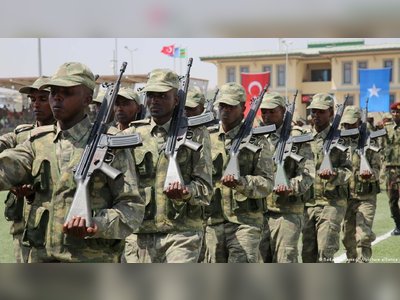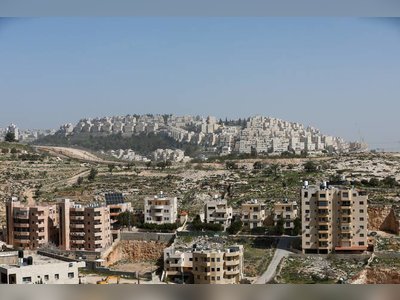
A Lifetime Under Surveillance: A Syrian Family's Harrowing Past with Homs Security Apparatus
The end of Assad’s regime brings closure to a family's relentless ordeal of living next to a brutal security unit known for torture and fear
For 65-year-old Taha Tadmori, an apartment in Homs was not just a home but a constant reminder of the fear and control that characterized life under the Assad regime in Syria.
Living next door to the infamous Homs security directorate, Tadmori's family endured decades of their privacy being invaded and living under the omnipresent shadow of surveillance and torture.
The Homs security directorate, notorious for its brutal practices, became a part of Tadmori's life in his adolescence.
Since then, the Tadmori family had a firsthand view of the realities of authoritarianism exercised by Hafez al-Assad and later by his son, Bashar.
For most residents in this Sunni-majority neighborhood, the building was a symbol of repression, instilling pervasive fear and uncertainty.
The apartment, offering an unsparing look at the directorate, was a vantage point from where Taha witnessed a harrowing timeline of abuses and violent crackdowns.
For over fifty years, officials would routinely appear at the Tadmoris' doorstep, inquiring about their lives and those around them, wielding information as a weapon to enforce compliance and perpetuate fear.
The officers, primarily drawn from the Alawite sect, mirrored Bashar al-Assad's reliance on his sect to enforce state security.
The brutal footprint of this security apparatus extended into personal tragedies.
Taha's brother, Firas, who was sweepingly detained 12 years ago, became one of the countless disappeared.
Firas's "crime" was trivial—working in a building where anti-government protests were documented—and his arrest was emblematic of the arbitrary detentions typical of the Assad regime.
Subsequent searches for Firas, including entreaties to high-ranking officials like the sanctioned directorate chief Husam Louka, were futile.
Despite initial reassurances, Firas was detained in facilities notorious for human rights abuses, such as Branch 215.
He vanished without a trace.
Assad's reign, synonymous with such suppression, crumbled last month when insurgent group Hayat Tahrir al-Sham ousted him from power.
This turnover signifies a pivotal transformation for many Syrians who have lived under relentless fear.
For Taha, it marked a profound cessation of regular visits from security officials, who had oftentimes enlisted his compliance for information under the guise of surveillance.
With the regime's fall came an immediate yet surreal shift.
Taha, who was restricted from even using his balcony freely, witnessed the once-omnipotent security staff abandon their posts as revolutionaries and locals overran the security directorate.
Their liberation efforts yielded few results—most detainees, including Taha's brother, were nowhere to be found.
Overnight, the officials who had known every intimate detail of his family's life had vanished, leaving behind only their desolate headquarters.
A chance meeting with one former official in a local pharmacy cornered Taha into an unexpected interaction—decades of pent-up fear and bitterness bubbled to the surface.
Yet, instead of recrimination, Taha chose an embrace, symbolically closing a chapter of oppression with a plea for normalcy.
As Taha contemplates the future, he humorously envisions the erstwhile locus of fear transforming into a beacon of hope, perhaps a school, under new governance.
The ending of Assad's era, he hopes, will chart a fresh course for Syria—a narrative of healing in the canvas of broader regional transformations.
Living next door to the infamous Homs security directorate, Tadmori's family endured decades of their privacy being invaded and living under the omnipresent shadow of surveillance and torture.
The Homs security directorate, notorious for its brutal practices, became a part of Tadmori's life in his adolescence.
Since then, the Tadmori family had a firsthand view of the realities of authoritarianism exercised by Hafez al-Assad and later by his son, Bashar.
For most residents in this Sunni-majority neighborhood, the building was a symbol of repression, instilling pervasive fear and uncertainty.
The apartment, offering an unsparing look at the directorate, was a vantage point from where Taha witnessed a harrowing timeline of abuses and violent crackdowns.
For over fifty years, officials would routinely appear at the Tadmoris' doorstep, inquiring about their lives and those around them, wielding information as a weapon to enforce compliance and perpetuate fear.
The officers, primarily drawn from the Alawite sect, mirrored Bashar al-Assad's reliance on his sect to enforce state security.
The brutal footprint of this security apparatus extended into personal tragedies.
Taha's brother, Firas, who was sweepingly detained 12 years ago, became one of the countless disappeared.
Firas's "crime" was trivial—working in a building where anti-government protests were documented—and his arrest was emblematic of the arbitrary detentions typical of the Assad regime.
Subsequent searches for Firas, including entreaties to high-ranking officials like the sanctioned directorate chief Husam Louka, were futile.
Despite initial reassurances, Firas was detained in facilities notorious for human rights abuses, such as Branch 215.
He vanished without a trace.
Assad's reign, synonymous with such suppression, crumbled last month when insurgent group Hayat Tahrir al-Sham ousted him from power.
This turnover signifies a pivotal transformation for many Syrians who have lived under relentless fear.
For Taha, it marked a profound cessation of regular visits from security officials, who had oftentimes enlisted his compliance for information under the guise of surveillance.
With the regime's fall came an immediate yet surreal shift.
Taha, who was restricted from even using his balcony freely, witnessed the once-omnipotent security staff abandon their posts as revolutionaries and locals overran the security directorate.
Their liberation efforts yielded few results—most detainees, including Taha's brother, were nowhere to be found.
Overnight, the officials who had known every intimate detail of his family's life had vanished, leaving behind only their desolate headquarters.
A chance meeting with one former official in a local pharmacy cornered Taha into an unexpected interaction—decades of pent-up fear and bitterness bubbled to the surface.
Yet, instead of recrimination, Taha chose an embrace, symbolically closing a chapter of oppression with a plea for normalcy.
As Taha contemplates the future, he humorously envisions the erstwhile locus of fear transforming into a beacon of hope, perhaps a school, under new governance.
The ending of Assad's era, he hopes, will chart a fresh course for Syria—a narrative of healing in the canvas of broader regional transformations.







